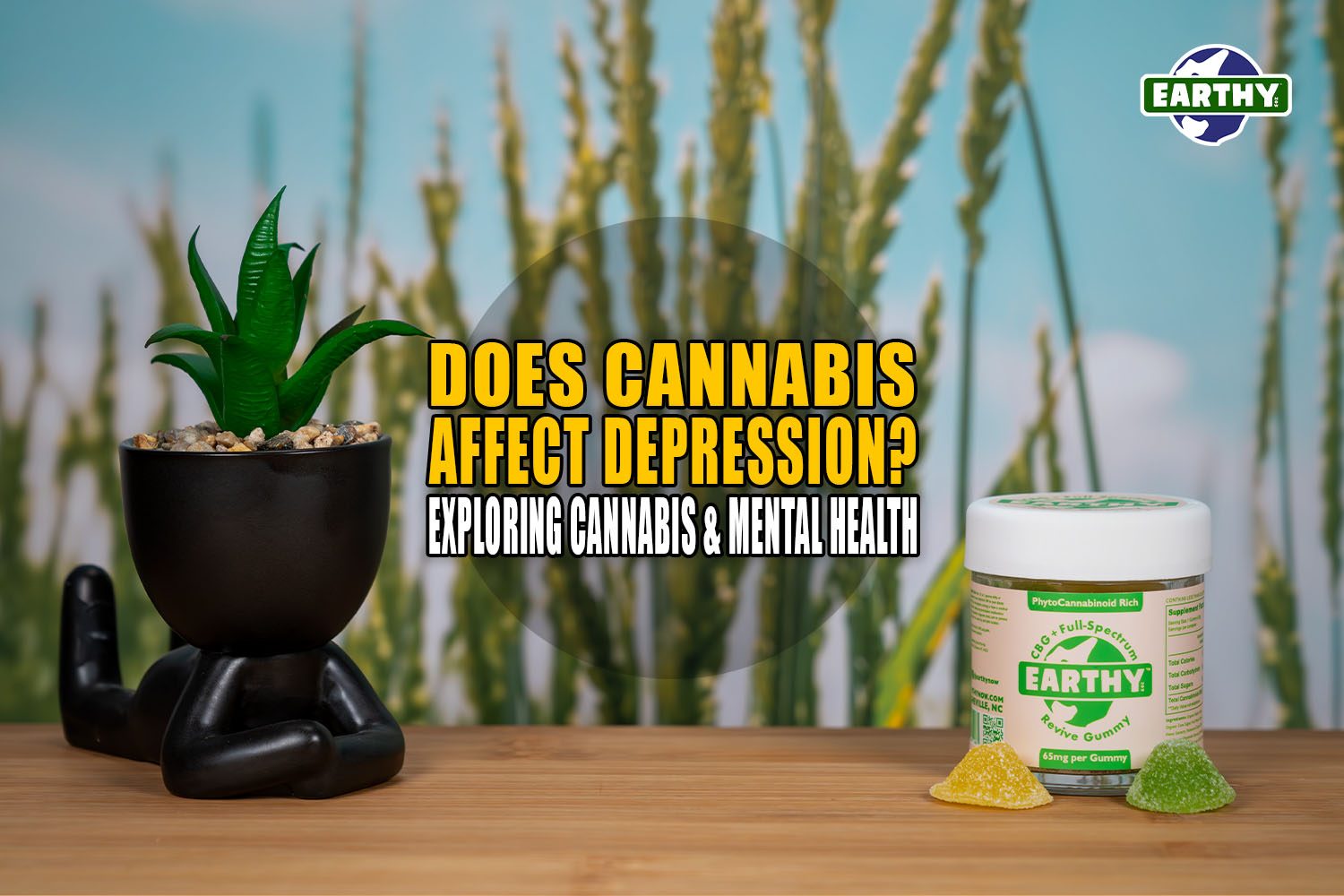Since the recent burgeoning of the cannabis industry, interest has emerged in the potential effects of cannabis on mental health, particularly its impact on depression. As mental health issues continue to affect millions worldwide, researchers seek to demystify the complex relationship between cannabis and depressive symptoms. This article aims to shed light on this topic by examining current research findings regarding cannabis and depression. Additionally, we’ll discuss the potential risks and benefits of cannabis use, highlighting the need for further research.
Understanding depression and mental health
Depression is a prevalent mental illness characterized by persistent feelings of sadness, hopelessness, and loss of interest in activities. Sadly, the condition affects people of all ages and backgrounds. For many, depression significantly impacts daily functioning and quality of life. However, mental health conditions, including depression, are complex and influenced by various factors such as genetics, environment, and life experiences. Thus, optimal treatment varies significantly among depression sufferers [1].
Do Full-Spectrum CBD Gummies Help with Anxiety?
The role of cannabis in mental health: is there a place for it?
People have used both hemp and marijuana for medicinal and recreational purposes for centuries [2]. Notably, the plant contains many active compounds. For example, THC (tetrahydrocannabinol) is the main psychoactive component responsible for mind-altering effects. However, CBD (cannabidiol) is non-psychoactive. In recent years, CBD has gained attention for its potential wellness properties, including its purported ability to modulate mood or stress [3]. However, CBD has not been FDA-approved for depression. It has only been approved by the FDA for use in one medication, which treats a particular seizure disorder: Epidiolex [4]. Even so, many individuals report CBD benefits them in various ways.
The Differences Between CBD, CBN, and CBG: Cannabinoids for Wellness
Research findings on cannabis and depression: does cannabis affect depression?
The relationship between cannabis use and depression is complex, and more research is needed to fully understand it. However, some studies have found that certain individuals may use cannabis as a means of self-medication to improve wellness and mood – even if they do not understand the science or lack of it. Cannabis in this sense is typically full spectrum, ie. the complete plant, not just an isolated cannabinoid. It should be noted that CBD is but one component of the plant although a seemingly quite powerful one [7].
How Much Cannabis Will Increase Libido?
Exploring cannabis as a mood elevator
Many individuals seek cannabis as a means to elevate mood, boost creativity, and induce feelings of happiness and relaxation [5]. This perception is supported by anecdotal evidence and some research studies that suggest certain cannabinoids, such as THC, may have mood-enhancing effects for some users. However, the relationship between cannabis use and mood elevation is nuanced and varies from person to person [5].
Cannabis for ADHD: Myth or Miracle?
For example, research, including a population-based longitudinal study, shows that while some individuals may experience temporary mood elevation from cannabis use, others may have poor outcomes [7].
It’s important to note that various cannabinoids, including THC and CBD, affect individuals in different ways, and cannabis use elicits a range of responses. For some, cannabis may exacerbate symptoms of mood swings, especially when used regularly or at high doses. Individuals with co-occurring mental health conditions may be particularly susceptible to the potential adverse effects of cannabis on mood stability [5]. Therefore, those who seek CBD as a mood elevator, especially people with underlying mental health concerns, should consult their doctor before using it.
Cannabis and PTSD: Shedding Light on a Complex Relationship
Individuals with predispositions to depression must exercise caution with cannabis use
While some people may find relief from various issues through medical marijuana where it is sanctioned, or others through hemp cannabis products, some folks with mental health predispositions, especially young people, may experience negative outcomes. These can potentially include cannabis addiction, worsened anxiety, or even psychosis [8]. As such, individuals need to consult healthcare professionals before using cannabis.
However, non-psychoactive cannabis products, such as CBD, are great for most individuals [9]. Reputable companies like Earthy Now provide safe and effective CBD products for many tastes and needs.
How Does Cannabis Consumption Affect Your Brain and Cognitive Functions?
Earthy Now’s wellness-boosting hemp products
For those who want to avoid THC, these top-tier cannabis products offer profiles rich in other cannabinoids and terpenes. These products provide the cleanest and strongest CBD, CBN, CBG, CBC, CBDv, and CBDA products in the industry, with only trace amounts of Delta-9 THC (no more than 0.3%). Earthy Now provides the perfect balance in products while ensuring low THC levels per federal guidelines. Customers report various effects, from clear-headed alertness and energy to relaxation.
Earthy Now offers a full line of CBD, CBN, and CBG products, including:
Potential benefits and risks of cannabis use
While some individuals may perceive cannabis as a potential buffer against the blues, it’s essential to consider both the potential benefits and risks. For example, medical cannabis, prescribed by healthcare professionals, has shown promise in alleviating symptoms of various concerns in some patients. However, recreational cannabis use, particularly at high doses and among vulnerable populations such as young people, may pose risks to mental health [8]. However, these outcomes typically stem from marijuana use versus hemp use because of marijuana’s higher THC levels.
Sex and the Endocannabinoid System: Chemistry in the Bedroom
Heavy or long-term cannabis use has been linked to potential cognitive impairments, sleep problems, and difficulties in executive function. All of these potential effects could further exacerbate mental health problems but more research is required [10]. Thus, those in populations vulnerable to mental health disorders should exercise caution and consult their healthcare provider for guidance.
The need for further research and education
As the legalization of cannabis for both medical and recreational purposes expands, more research must continue to navigate its effects on mental health. For example, researchers call for more longitudinal studies to track cannabis use patterns and mental health outcomes over time. These types of studies will help the community understand the long-term impact. of cannabis on depression and other psychiatric disorders.
Furthermore, public health efforts should focus on raising awareness about the potential risks of cannabis use, particularly among vulnerable populations. For instance, education campaigns aimed at young people can help promote informed decision-making and mitigate potential harms associated with cannabis use.
Explore Earthy Now’s Exceptional Hemp Products
Key takeaway: does cannabis affect depression?
In conclusion, the relationship between cannabis use and depression is complex and multifaceted. While some individuals may perceive cannabis as a potential buffer for depression, the evidence regarding its efficacy and safety remains inconclusive. More research is needed to better understand the impact of cannabis on mental health. More information can inform evidence-based interventions and policies aimed at promoting mental well-being. Ultimately, addressing the intersection of cannabis use and depression requires a comprehensive approach that considers individual differences and the broader context of mental health care.
For safe, hemp-derived wellness products, visit the Earthy Now Shop online today!
Medical Disclaimer / Legal Disclaimer – Information is provided for educational purposes. It does not and is not intended to constitute legal advice or medical advice. We attempt to be accurate and up-to-date, but the legality of cannabinoids and the science of cannabis are evolving. The author is neither a legal professional nor a medical expert. Before buying or using any products, you should check with your local authorities and medical providers.
References
- Cleveland Clinic: Depression
- History of Cannabis and the Endocannabinoid System
- Can CBD Help Treat Depression?
- Epidiolex: FDA-Approved CBD Medication
- Depression and Marijuana
- CBD for Depression and Anxiety
- Cannabidiol: A Potential New Alternative for the Treatment of Anxiety, Depression, and Psychotic Disorders
- Mental Health, Young Adults, and Weed
- Is CBD Safe?
- Cannabis Use Disorder Triples Risk of Depression, Anxiety
- Cannabis Use and the Abuse of Other Substances




 Earthy Now
Earthy Now Earthy Now
Earthy Now